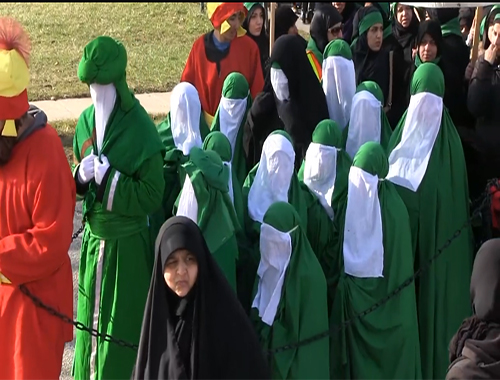Who are the Shi'a?
- Details
- Hits: 4304
Chapter 2
Who are the Shi'a?
--------------------------------------------------------------------------------
The fifth imam of the school of ahl al-bayt, Imam Muhammad al-Baqir (pbuh) once told one of his students by the name of Jabir: "Is it enough for a person to embellish himself as our shi'a (follower) by professing love for us, the ahl al-bayt? Nay! By Allah, a person is not our follower unless he fears Allah and obeys Him. Our followers are only recognized, O Jabir, by their humility; submission; honesty; abundant praise of Allah, fasting and prayers; goodness to their parents; attention to the poor, needy, debtors, and orphans living nearby; speaking of the truth; recitation of the Qur'an; holding their tongues except for good words; and trustworthiness towards relatives in all affairs."[1]
"Shi'a" means "a group of followers" and occurs in the Qur'an many times in reference to the followers of the previous prophets, such as Prophet Abraham and Moses (pbuh).[2] Shi'a today refers to the followers of a particular school of Islamic thought which is based on the teachings of the Holy Prophet (pbuh&hf) and his family and is also sometimes referred to as the school of ahl al-bayt (the family of the Holy Prophet). While no schools of thought existed at the time of the Holy Prophet Muhammad (pbuh&hf), the Prophet (pbuh&hf) still used to refer to a certain group of people as the shi'a of 'Ali.
Some of the narrations in which the Holy Prophet Muhammad (pbuh&hf) used the term "shi'a 'Ali":
"The parable of 'Ali is like a tree, of which I am the root, 'Ali is the branch, Hasan and Husayn are the fruits, and the shi'a are the leaves."[3] (Ibn Hajar)
"We were gathering with the Prophet (pbuh&hf) when 'Ali ibn Abi Talib (pbuh) came. He said, 'Verily, my brother came to you,' and he placed his hand on the Ka'bah and said, 'By the One Who holds my soul in His hand, this man and his shi'a are indeed the successful ones on the Day of Judgement'."[4] (narrated by Jabir ibn 'Abdillah al-Ansari)
"The Prophet of Allah (pbuh&hf) was with me when his daughter Lady Fatima came to greet him with her husband 'Ali. The Prophet of Allah (pbuh&hf) raised his head and said, 'Be glad, 'Ali; you and your shi'a are in the Paradise'."[5] (narrated by Um Salamah, the wife of the Holy Prophet Muhammad (pbuh&hf))
And again, the Holy Prophet Muhammad (pbuh&hf) said to Imam 'Ali (pbuh): "You and your shi'a are in the Paradise."[6]
As these narrations show, the Holy Prophet Muhammad (pbuh&hf) himself founded the use of the term shi'a in his own lifetime. After he (pbuh&hf) passed away, those who were loyal to Imam 'Ali (pbuh) were also known as the shi'a. During the second century hijri (i.e. two centuries after the migration of Holy Prophet Muhammad (pbuh&hf) from the city of Makkah to the city of Madinah - the event which marks the beginning of the Islamic calendar), the 'Abbasid caliphs officially patronized the four Sunni schools of thought which were popularized by the enthusiasm of some of their leaders. As for the Shi'a, after the assassination of Imam 'Ali (pbuh), they followed the leadership of his son Hasan (pbuh), and after him his brother Husayn (pbuh) and the subsequent nine imams who were the descendants of Husayn. They followed them on the firm basis of evidence in the Holy Qur'an and the tradition of Holy Prophet Muhammad (pbuh&hf) who repeated explicitly on many occasions that he would be followed by twelve imams after himself who would all be from the tribe of Quraysh.[7] (see p. 21)
Therefore, Shi'ism is the following of the Holy Qur'an and the tradition of Holy Prophet Muhammad (pbuh&hf) as conveyed by his family whom he (pbuh&hf) appointed (the ahl al-bayt). After the Holy Prophet Muhammad (pbuh&hf), the Shi'a follow the twelve divinely ordained imams as successors to the Holy Prophet Muhammad (pbuh&hf), as shall be seen in the subsequent sections.
Notes:
[1] Al-Kafi, al-Kulayni, 2:74
[2] Holy Qur'an, 28:15
[3] Lisan al-Mizan, ibn Hajar, 2:354
[4] Tawzih al-Dala'il fiTashih al-Fada'il, p. 505
[5] ibid., p. 507
[6] The History of the City of Damascus, ibn Asakir, in the section on the biography of Imam 'Ali (pbuh)
[7] Sahih Bukhari; Sahih Muslim, 2:191; Sahih Tirmidhi, 2:45; Musnad Ahmad ibn Hanbal, 5:106; Sunan Abu Dawud, 2:207











